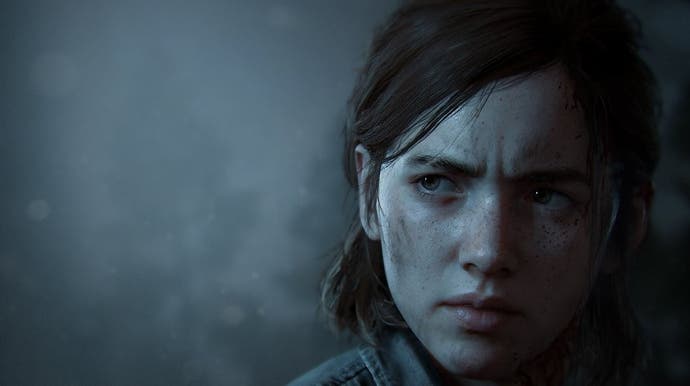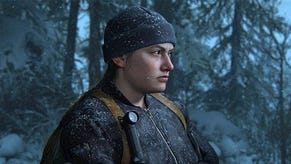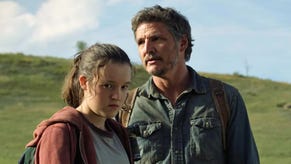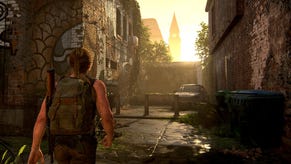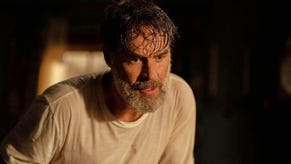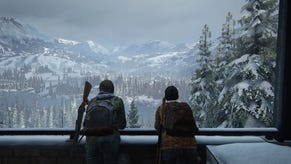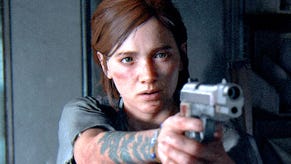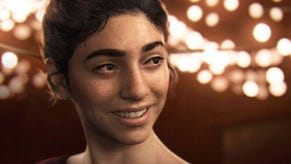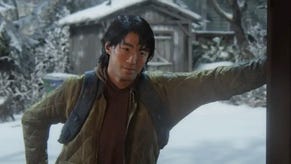A spoiler-heavy interview with The Last of Us Part 2 director Neil Druckmann
"I've seen people say online, you disrespected the characters. *************! No-one loves these characters more than we do."
SPOILER WARNING: THIS ARTICLE DISCUSSES THE FULL STORYLINE OF THE LAST OF US PART 2, INCLUDING ITS ENDING.
Before The Last of Us Part 2 was released - but after we had finished playing it, and after its plot had leaked online - we had a chance to interview the game's director Neil Druckmann. It was too good an opportunity to discuss the game's full storyline and radical structure with its creative lead to miss. So here is the second, spoiler-heavy part of our chat - and please, only read on if you have already finished the game.
When you get to the second half of the game, it's so sad that you're meeting these people (and these dogs) that you've already killed. And it's like... I was feeling shame. And I was feeling guilt. I'm not used to feeling those things in games. That's an uncomfortable feeling.
You mentioned shame and guilt. Those are things that are uniquely videogame-y, right? It's like, I just committed those acts. I am complicit in those acts. And now I get to see the consequences of those acts by empathising with these other people. You know, in marketing the game we talk about it one way, but really the game is about something different. We say it's a game about hate, but that's not true. It's a game about empathy. It's a game about forgiveness.
The whole thing was constructed in such a way as to say, in the beginning of the game, we're going to make you feel such intense hate that you can't wait to find these people and make them pay. And that's the stuff you're seeing online... You'll have seen some of the leaks. The way that they've dehumanised Abby and the way that they're talking about Abby, it's kind of horrifying. And yet it's completely human. It's what we do.
We've seen this time and time again. We watch interviews of parents that have lost their child or someone they love to violence. They say, if I could get my hands on the person responsible, I will skin them alive. And I believe them, I believe that under the right circumstances, normal human beings are capable of that. So the exploration with this game is, like, how can we start with that state and then make you reflect on it? And then maybe, maybe... if something happens in the world outside of the game, there's some of that is left over so you at least pause and say, OK, what is it like to be in this other perspective?
The final fight between Ellie and Abby is so desperate and so hollow that there's really no victory there either. I was just so angry at Ellie. I was so ready to hate Abby in the beginning, and my perspective on both of them completely shifted. Was the intent of that fight to have you without a doubt that Ellie is the villain?
For me, hero and villain is too much of a judgement for the way we approached it. It's to say: here are a bunch of flawed characters that make flawed choices and have to deal with those choices, and say, can you come back from that?
Ellie's story is the quest of trying to fill this hole that was left when Joel died, and thinking with each death, maybe if I can make it feel more like what they did to him... so each death gets more and more brutal and takes away more and more of her humanity. She's hoping to fill that hole. It's this empty pursuit - and again, this is based on real interviews we watched with someone that, let's say, has a person that did their family wrong and then that person is executed, capital punishment, and the interviewee after is like, it didn't solve anything. The person didn't come back.
And then the Abby journey is one of redemption. She's dedicated the past five years to finding and killing Joel. She's made herself into this weapon. She's imagining he's this larger-than-life person, he's like the devil in her mind, and you see that; this group is terrified of this man even after they shoot his leg off. They're terrified of him. They're shaking. And then it's this kind of pathetic thing, the way he dies. It's not satisfying in any way, it's just sad. So then it's exploring what her redemption is after that. Her redemption is saving these kids from a group that she's been locked in war with and she's killed who knows how many dozens of. And that's where she finds purpose. That's a positive thing.
To get to your point, with that fight, our hope - and I know there's gonna be people that feel different ways - our hope was, you're rooting for both characters. Ellie gets to the same point, almost like where Abby was, where she has certain expectations of what this fight is going to be, and it's way more pathetic than that. Abby is not the person that is the person that killed Joel. It's a person that has suffered and has found redemption. And you as a player have the full context for both characters, and you understand how futile this fight is.
Where did the idea for using the Pearl Jam song Future Days come from? It's such a leftfield song, but it works really well.
It's actually kind of a weird story. When we finished the first game, Geoff Keighley reached out to us - he wanted to do The Last of Us: One Night Live, where we would bring the actors on stage and they would act out scenes from the game. Now I thought, yeah, that's kind of interesting, but maybe there's a way to take advantage of it and just write something unique for the stage. I'm gonna have Troy and Ashley there - what if we could explore a scene after the events of the first game? I wrote this scene where Joel brings this guitar to Ellie. There's this tension between them and there's a song... And I am obsessed with Pearl Jam at the time and just in love with the song, and I check the timeline...
It literally comes out the month of the outbreak!
It actually hadn't come out before the outbreak. But there were live performances on YouTube of Eddie Vedder performing the song, so it's possible that Joel could have learned it. But once we had made that scene and put it out there, I felt - that's the opening of the game. I know that's the opening of The Last of Us 2.
Lev is a wonderful character. He's one of the few, you could say, innocent characters in the whole thing. And the simplicity with which he explains his situation - "I shaved my head" - is really poignant. Did you consult with trans people or LGBTQ+ groups over how his story is handled, via Yara and the cult?
[Editor's note: some trans commentators - but not all - take issue with Lev's representation. VG247 has an excellent article by Stacey Henley on the subject.]
Yes. We hired a religious consultant - like, OK, we're gonna make a religion here. Let's at least make sure we know the minefield we're entering and what the things that might offend people are. Look, our thing was, you can't make a piece of art that's this challenging that's not going to offend someone, but let's at least be thoughtful and mindful, so we know we're not accidentally making narrative choices - narrative choices are there in service of the story.
We have actually quite a few transgender people on the team that we were constantly talking with, we read a lot of books, we watched interviews, we brought a consultant in to walk us through a lot of that stuff. And then, once we had filled our mind with that stuff, it's like OK, now we have to forget all that and just treat it like a character, like another person in the world.
It's not diversity for the sake of it - like, OK, let's have a trans character just so we can like check that off the box - no, that actually became a really interesting thing to explore within a religion. Here's someone that is hunted by people that are following this religion, and he's still religious, spiritual, he just interprets the material differently. That's what diversity gets us, a fresh perspective. It's a new way to look at a story.
What was your main hope for the character of Abby when you started out?
It's kind of what I described: I wanted people to hate her immensely. Where they think they want to do horrible things to her.
When I was pretty young, around Ellie's age, I was watching the news and I saw a lynching that was caught on camera. And it affected me at such a deep level - the violence, and there was, like, cheering within it. It really disgusted me. And in my mind, I was like, I would want to kill all these people. If I could just push a button, I would do it. If I could be in a room with one of these people that did some of the more horrific stuff, if they were tied to a chair, I think I could torture them. That's where my mind went.
And then, years later, you reflect on that and you're like, that's really messed up. You know, I've lived a normal life, I've only been in a handful of fights in school, nothing major, and... how easily my mind was able to tip into that kind of state, just by watching something. And then trying to imagine, damn, what would happen if that was someone close to me. Those are strangers. I don't even know any of those people. I don't know the victims. I don't know the people that perpetrated that.
It became this interesting philosophical debate in my head that I've had for many years. Then I said, OK, in a game, we could probably make you feel those same feelings - and we know we have a character as beloved as Joel that people see almost as a family member, going by the reaction to the leak. We can get you to feel those feelings.
The challenge is what we said all along: if people don't ever understand Abby, the whole game fails. It doesn't work. If, all the way through, you just want nothing but revenge and never empathise with her, the game falls apart. And that's where most of the effort for the game went, to make Abby... not necessarily good. The pitfall a lot of writers with this kind of story fall into is like, OK, we need people to like Abby, let's make her perfect. She does nothing wrong. She only makes moral choices. But no, that's not where empathy comes from. Actually, empathy comes from making mistakes and challenging and trying to correct your mistakes and overshooting and messing up. I guess our hope is that people see her as a human, as a complex human.
In the game, you want to really hurt people, but then you're faced with the reality of it. And you feel, this is a lot harder than I thought it would be - because it should be hard, right?
I don't know if you've seen Saving Private Ryan, but that movie left such an impact on me. Because, one, it's really an entertaining film. You want to watch it all the way through, you want to follow those characters. And yet it's disturbing and uncomfortable and challenging, and messes with what you thought about action stories. It makes them more grounded. And you see the horror of it all. And that's our hope - not to just gross out people and make them want to turn the game off. Hopefully the story's compelling and pushes you forward, but you feel the weight of your actions in a way that's different from other action games.
The challenge with doing something new, at least new for us... is you don't know what the reception's going to be. And you're seeing some of it now with the reaction to the leaks. I think games have trained us to have a certain expectation from sequels. It's like, I expect to play certain characters, I expect for things to play out a certain way. And we wanted to really challenge that. I'm sure there are examples, but I have a hard time thinking of a sequel that killed off the protagonist. And then it was important for us not to kill them in a heroic way to kill them in this unceremonious, brutal, disgusting way. When we wrote that scene, it was meant to be disturbing to us, so we know it's gonna be disturbing for fans of the first game.
On the surface, I could see fans of the first game being repelled by this. But if they dive in and see the heart of it, it's like... Joel is throughout the whole story. You feel his presence through every beat of that story because his actions, his relationship with Ellie, permeate throughout the whole thing. And you see that in those flashbacks and in that final moment where Ellie is really reflecting about forgiveness, that final conversation that they had where she felt that he wronged her in such a way she was ready to be done with him. And yet she was able to let that go. And I think that's Ellie's humanity - the core that is still good within her, despite all these hard choices.
What did Troy Baker and Ashley Johnson think of the arcs for their characters?
Uh, haha. I remember the first time I pitched it to Ashley, it was right after I pitched her Left Behind, we were in a restaurant, and she was moved by that. And we're about ready to shoot and I was like, oh, by the way, I have this other concept, this rough outline for what I think the sequel could be. And she was, like, just sobbing. But she loved it.
And I think Troy, in that same way... Look, the material was challenging even for them. I've seen people say online, basically, you disrespected the characters. Motherfuckers! No-one loves these characters more than we do.
Except for maybe Troy Baker. No-one loves Joel more than Troy Baker.
